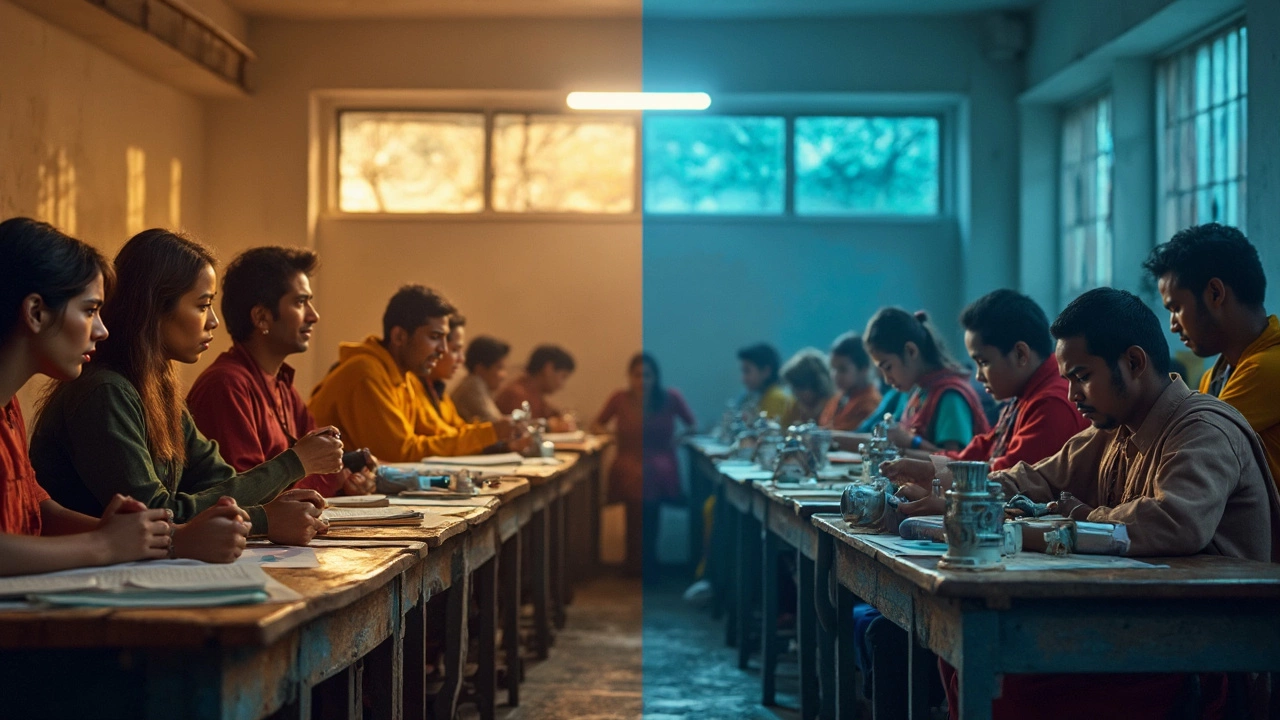
College vs. Vocational Training: Key Differences Explained
So you're at a crossroads, trying to decide between heading off to college or diving into vocational training. It's not an easy choice, but knowing the basic differences can help clear things up. College is often seen as the traditional route – you spend a few years diving deep into varied subjects while racking up a mountain of knowledge (and sometimes debt). But vocational training focuses on equipping you with specific skills tailored for particular jobs, often getting you career-ready faster.
Take cost and time into consideration. College can be expensive and may require four or more years, whereas vocational courses are typically shorter and more budget-friendly. It's about weighing the upfront time and financial investment against long-term career aspirations.
- Overview of College Education
- Vocational Training Explained
- Time and Cost Factors
- Types of Careers
- Skill Development
- Deciding What's Best for You
Overview of College Education
When we talk about college education, we typically refer to an academic journey that spans across four (or more) years. It's a place where students dive into a broad range of subjects, from the arts to the sciences, while developing critical thinking skills. This path offers a comprehensive learning experience that aims to prepare students not just for a specific job, but for a variety of career options in today's workforce.
Curriculum and Structure
A typical college program includes core courses, electives, and sometimes, prerequisites before one can focus on a major. Students often spend the first couple of years fulfilling general education requirements, which cover a wide array of topics. The idea is to cultivate a well-rounded individual who can adapt to different situations and challenges.
Degrees and Qualifications
College education usually culminates in a degree, like a Bachelor of Arts (BA) or Bachelor of Science (BS). These degrees can open doors to advanced education opportunities, such as master's or doctoral programs.
In terms of stats, according to the National Center for Education Statistics, as of October 2020, there were about 19.6 million college students enrolled in the U.S. alone. This number highlights how many people see college as a viable path toward a successful future.
Pros and Cons
- Pros: Diverse knowledge base, networking opportunities, flexible career paths.
- Cons: High tuition costs, potential student debt, longer time to enter the workforce.
Ultimately, the choice to pursue a college education depends on individual goals and financial considerations, as well as the career paths one is interested in exploring.
Vocational Training Explained
Vocational training is all about practical learning. Instead of diving into textbooks and theories for years, you get hands-on experience to jump right into a job. It's about learning the ropes of a specific industry or profession. Think of it as fast-tracking your career without the long-haul of college.
There's a wide variety of programs available, ranging from traditional trades like plumbing and carpentry to modern tech roles like coding or network management. These programs often last from a few months to two years, focusing heavily on the skills you need to succeed in the workforce.
Why Choose Vocational Training?
- Time Efficiency: Unlike a standard college degree, vocational courses are swift, usually completed in less than two years.
- Cost: Often more budget-friendly than college, making it a great option if finances are tight.
- Job Readiness: Employers often value the specialized skills that come with vocational training, as it means you can hit the ground running.
- Variety: There's a diverse range of fields, so you're bound to find something that clicks with your interests.
According to the National Center for Educational Statistics, vocational school graduates have a job placement rate of around 85% within six months of completing their programs. That's significant when considering the competitive job market!
By opting for vocational training, you also get the chance to network within your chosen industry from early on. Many programs offer internship opportunities, letting you make connections that could help land you a job post-training. In short, if you're keen on getting into a specific job without the extraneous stuff, vocational training could be your ticket in.
Time and Cost Factors
When it comes to choosing between college and vocational training, the time and cost involved can be deal-breakers. College typically takes about four years if you're pursuing a bachelor's degree. That's a significant chunk of time, not to mention a financial commitment that can have you shelling out thousands.
On the other hand, vocational training is designed to get you job-ready in a much shorter period. Programs can range from just a few months to about two years. And because they focus on practical skills, you often spend less money—sometimes significantly less. This makes them an attractive option if you're itching to start your career soon or want to avoid a hefty student loan.
Here's a quick peek at a comparison:
| Program Type | Typical Duration | Average Cost Range |
|---|---|---|
| College Bachelor's Degree | 4 years | $40,000 - $100,000 |
| Vocational Training | 6 months to 2 years | $3,000 - $15,000 |
When considering the costs, don't forget to look into potential scholarships or grants for both options. Many vocational programs also offer financial aid or have payment plans that make tuition more affordable.
Time vs. Financial Benefits
Think about what matters more to you right now. Do you prefer investing more time to get a degree that might open doors to broader opportunities? Or is starting work immediately with a more specific skillset a more tempting offer?
The bottom line is that both paths have their pros and cons, but understanding these basic differences can help you pick the one that's right for your situation.

Types of Careers
Let’s get into one of the most critical aspects: the career paths that college and vocational training can open up for you. It's a big factor in deciding which educational route to follow.
College Career Paths
If you’re eyeing careers that traditionally require a degree, like medicine, engineering, or law, then college is likely your way forward. These fields usually demand a deep understanding and often advanced degrees. Plus, many employers in corporate sectors consider a degree a baseline requirement.
- Medicine and Healthcare: From doctors to pharmacists, college is a must for these roles.
- Engineering: Most engineering fields require a bachelor’s degree as a starting point.
- Law: Getting into this field involves not just an undergraduate degree but additional years in law school.
Vocational Training Career Paths
Vocational training is all about teaching you hands-on skills for specific jobs, often allowing you to jump into the workforce quickly. You might be surprised by the variety and the solid earning potential.
- Trades: Think electricians, plumbers, and carpenters. These roles are in high demand and usually offer good job stability.
- Technical Skills: Careers like IT support or network administration often start with vocational certification.
- Healthcare Support: Roles like nursing assistants or dental hygienists typically require vocational credentials.
The table below gives a snapshot of some popular choices:
| Field | College Path | Vocational Path |
|---|---|---|
| Medical Practitioner | Yes | No |
| Electrician | No | Yes |
| Software Developer | Yes | No |
| Nursing Assistant | No | Yes |
Ultimately, which path you choose should align with your career goals and life plans. It’s essential to think beyond the first step and consider where each path could eventually lead.
Skill Development
When it comes to developing skills, both college and vocational training offer different flavors of education, each with its own spin. Let's break it down.
College - A Broad Spectrum
In college, you might pursue a degree in something like Business or Engineering. Sure, you'll get a deep dive into your major, but you're also going to spend time on subjects that aren't directly tied to your future job. Think humanities, languages, or even an elective like pottery. It's all part of the college package, where the idea is to shape well-rounded individuals, ready for the complex business world.
Vocational Training - Precision Focusing
On the flip side, vocational training skips the fluff and gets right into the nitty-gritty of job-specific skills. Imagine you're training to be an electrician. You'll learn the code, wiring specifics, troubleshooting, and maybe even some automation. It's all about sharpening skills for immediate entry into the workforce.
| Education Type | Focus | Duration |
|---|---|---|
| College | Broad and diverse | 4+ years |
| Vocational Training | Specific and job-focused | 1-2 years |
It's pretty clear that vocational training zeroes in on practical, hands-on experience more than theory. You hit the ground running once you've completed your course. But remember, wages align accordingly; a specialized skill could mean stepping into higher-paying roles right from the get-go.
So, if you're itching to start working and get skilled fast, vocational routes might be your best bet. But, if a broader education excites you, and you're up for a longer journey, college might be the way to go. Both lead to strong career paths, just in different ways.
Deciding What's Best for You
Alright, so we're at the big decision point: college or vocational training? It all comes down to what kind of life and career you envision for yourself. Start by asking yourself a few important questions: Do you see yourself in a specific hands-on job, or are you aiming for a field that typically requires a degree?
Consider Your Career Goals
If you're aiming for something that needs a broad education like teaching or engineering, college might be your go-to choice. But if you're leaning towards something skill-focused like plumbing or graphic design, vocational training can get you job-ready much quicker.
Think About Time and Cost
Another big factor is how much time and money you're willing to invest. A college degree usually means a four-year commitment, whereas most vocational courses wrap up in two years or less. Plus, vocational schools are typically easier on the wallet.
Look at the Job Market
Also, consider the types of careers these paths lead to. Vocational training often aligns with fields like healthcare, automotive tech, and construction, where skilled workers are in high demand. These roles often offer stable prospects with competitive salaries.
Consider Your Learning Style
Are you a hands-on learner who loves diving into projects, or do you prefer absorbing information through lectures and research? Vocational training often appeals to those who want practical, direct experience, whereas college provides a more academic, theoretical approach.
Crunch the Numbers
Let's take a quick look at some numbers for a better perspective:
| Path | Average Time | Average Cost (per year) |
|---|---|---|
| College | 4 years | $20,000+ |
| Vocational Training | 2 years or less | $10,000 or less |
The choice between these paths really hinges on your personal goals, financial situation, and learning preference. No path is inherently better—it's about finding what's best for you.






Write a comment